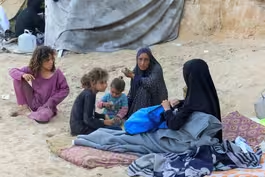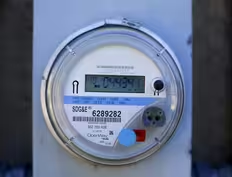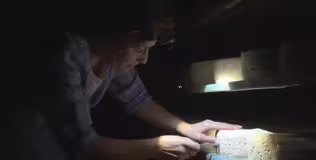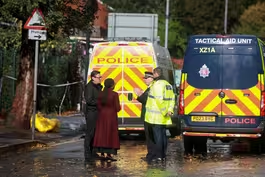
What to know about RFK Jr.’s efforts to address long COVID
Clip: 10/4/2025 | 7m 30sVideo has Closed Captions
What to know about RFK Jr.’s efforts to address long COVID research and treatments
More than two years after the WHO's COVID-19 public health emergency ended, millions of Americans are still living with long COVID. Symptoms vary from person to person, but range from mild to severe to physically debilitating. Recently, Health Secretary Kennedy kicked off new efforts to address long COVID. Ali Rogin speaks with two members of the long COVID community to learn more.
Problems playing video? | Closed Captioning Feedback
Problems playing video? | Closed Captioning Feedback
Major corporate funding for the PBS News Hour is provided by BDO, BNSF, Consumer Cellular, American Cruise Lines, and Raymond James. Funding for the PBS NewsHour Weekend is provided by...

What to know about RFK Jr.’s efforts to address long COVID
Clip: 10/4/2025 | 7m 30sVideo has Closed Captions
More than two years after the WHO's COVID-19 public health emergency ended, millions of Americans are still living with long COVID. Symptoms vary from person to person, but range from mild to severe to physically debilitating. Recently, Health Secretary Kennedy kicked off new efforts to address long COVID. Ali Rogin speaks with two members of the long COVID community to learn more.
Problems playing video? | Closed Captioning Feedback
How to Watch PBS News Hour
PBS News Hour is available to stream on pbs.org and the free PBS App, available on iPhone, Apple TV, Android TV, Android smartphones, Amazon Fire TV, Amazon Fire Tablet, Roku, Samsung Smart TV, and Vizio.
Providing Support for PBS.org
Learn Moreabout PBS online sponsorshipJOHN YANG: It's been more than two years since the pandemic ended, but millions of Americans are still living with long COVID.
That's a catch all term for COVID symptoms lasting at least three months after testing positive.
Symptoms can vary from person to person, but they range from mild to severe to physically disabling.
Recently, Health Secretary Robert F. Kennedy, Jr.
kicked off new efforts to address long COVID with a roundtable discussion with doctors, researchers and patient advocates.
ROBERT F. KENNEDY JR., Secretary of Health and Human Services: In the past, the response to epidemics of this kind of has been to pump a lot of money into ivory tower science to try to solve the problem.
We've already put $1.5 billion into NIH to solve Long COVID, and we've got literally nothing from it.
JOHN YANG: Ali Rogin spoke to two members of the long COVID community, Dr.
Michael Peluso, a physician and researcher at UC San Francisco who attended that roundtable meeting, and Meighan Stone, the executive director of the Long COVID Campaign.
ALI ROGIN: Michael and Meighan, thank you both so much for joining us.
Michael, first to you.
We just heard Secretary Kennedy say that there's been nothing to show for HHS investment so far in long COVID research.
What do you say to that?
MICHAEL PELUSO UC San Francisco: Well, I think many of us agree that progress has really been too slow.
There are a lot of patients really suffering a lot of disability, a huge economic cost.
At the same time, there's a lot of commitment on the part of clinicians caring for patients with long COVID, researchers really trying to figure out the answers for these patients.
What I think we need.
And what I hope that this roundtable will be the beginning of is a really clear both a short term plan and a long term plan for figuring this out.
We need a broader, organized strategy.
ALI ROGIN: So what would make up, Michael, sticking with you, that long and short term plan in order to make this strategy work?
What's needed?
MICHAEL PELUSO: There are actually three specific things that I advocated for at this meeting, and I think that there was kind of broad agreement on these things.
The first is real investment in a diagnostics and biomarker program, both to help people get a diagnosis of long COVID in the clinic, but also to help us identify individuals who may benefit from a specific treatment strategy or for participation in a specific clinical trial.
The second thing that we really need is a rapid scale up of the number of clinical trials that are happening.
We've seen some improvement, some increase in the number of clinical trials over the last couple of years.
But I'd like to see a dozen more clinical trials right now testing all of the different possible leads for what might cause long COVID and how we might help people feel better.
And then the third thing that we really need to help that happen is we need the pharmaceutical industry to get off the sidelines and to really commit to participating in clinical trials, putting their drugs up for testing, investing deeply in this problem so that we can get answers for people who are really debilitated from this condition.
ALI ROGIN: Meighan, as somebody who is a patient and an advocate, how are you feeling about the commitments that have been announced recently?
MEIGHAN STONE, Executive Director, Long COVID Campaign: Well, right now, Today, there's about 20 million Americans just like me who are living with long COVID and many of us were in the prime of our careers and lives and now are disabled and chronically ill.
And so the administration's announcements that Secretary Kennedy made were welcome.
It was really good to see the HHS secretary having a high level meeting, bringing together all the parts of government that we really need to work together to find a solution.
That's really what we need to see so that parents like myself can get back to volunteering at our kids schools, we can go back to our workplaces and patients can finally get the tests and the treatments that we've been waiting over five years for now.
ALI ROGIN: Meighan, you've been working on these things and advocating for your community for these five years.
Based on your experience, what are your hopes for what happens next?
And also where do your concerns lie?
MEIGHAN STONE: Like many patients, the Long COVID Campaign has been calling for biomarkers so that we can do research and figure out if treatments are going to work and hopefully get a test so that people in the United States, Americans who are disabled, can more easily qualify for disability, that we can see insurance coverage.
We really want to see the FDA move more quickly.
And we're hoping with these announcements from the administration that we'll see them more rapidly approved clinical trials with the endpoints that we need, and then work together on approving treatments and therapies that families and Americans living with Long COVID urgently need.
We didn't see the progress we needed under the Biden administration.
And I know so many patients are ready to work with this administration in an earnest way to actually solve this problem.
ALI ROGIN: And for both of you, COVID-19 and Long COVID are things that many Americans have quite simply moved on from, and yet there are many, many more people who are living with this every single day.
First to you, Michael, what do you want people who haven't been affected by Long COVID to know about this community?
MICHAEL PELUSO: I think it's really important that people understand that this can often be an invisible disease and that there are a lot of people really suffering and really debilitated by it.
And you know, I think that the investment in addressing this problem is likely to have benefits that extend beyond this problem.
Long COVID is a really, really challenging disease to study, to research, to treat, and it'll be a big problem to solve.
But I think that if we have the resources and the strategy and the long term plan to do it, this should be a problem that we can solve.
ALI ROGIN: And Meighan, Americans may feel like the pandemic's over or that COVID is in the rearview mirror, but even in just the last few months, we saw the announcement that Long COVID the most common childhood illness in the United States.
It even surpassed asthma so it's still with us.
And we know from recent research that the NIH just released that the numbers of people getting Long COVID, including children, adolescents, are just continuing.
This problem is not going away.
And people that have been sick for years are continuing to be sick.
They're not just resolving.
They need tests, they need treatments.
Most of all, I want patients to have hope, you know, and to call their elected members of Congress.
This is really a bipartisan or nonpartisan issue.
We have incredible champions for both Republicans, Democrats and even independents.
This is a problem we need to solve for the American people.
So I hope that patients will continue reaching out to the administration and to Congress and say that we need trials for antivirals, we need monoclonal antibodies, and we need a solution that's really going to work not just for people living with long COVID, but also the main millions of people who are living with many of the conditions we get diagnosed with when we get long COVID.
So, I hope that patients will have hope and where they have the energy to give to become part of our work calling for solutions so that we can get the tests and treatments and hopefully a care that we need.
Dr.
Michael Peluso and Meighan Stone, thank you both so much.
MICHAEL PELUSO: Thanks a lot.
MEIGHAN STONE: Thank you so much for having us.
Analyzing the sticking points of Trump’s Gaza peace plan
Video has Closed Captions
Clip: 10/4/2025 | 6m 38s | Former Middle East negotiator analyzes sticking points of Trump’s Gaza peace plan (6m 38s)
Are ‘vampire devices’ draining energy in your home?
Video has Closed Captions
Clip: 10/4/2025 | 5m 4s | Are ‘vampire devices’ draining energy in your home? Here’s what to do (5m 4s)
Meet the makers of the world’s most expensive cheese
Video has Closed Captions
Clip: 10/4/2025 | 1m 56s | Meet the artisanal makers of the world’s most expensive cheese (1m 56s)
News Wrap: 6 suspects questioned over UK synagogue attack
Video has Closed Captions
Clip: 10/4/2025 | 2m 11s | News Wrap: Authorities question 6 suspects linked to Manchester synagogue attack (2m 11s)
Providing Support for PBS.org
Learn Moreabout PBS online sponsorship
- News and Public Affairs

FRONTLINE is investigative journalism that questions, explains and changes our world.

- News and Public Affairs

BREAKING the DEADLOCK sparks bold, civil debate on America’s toughest issues.












Support for PBS provided by:
Major corporate funding for the PBS News Hour is provided by BDO, BNSF, Consumer Cellular, American Cruise Lines, and Raymond James. Funding for the PBS NewsHour Weekend is provided by...



